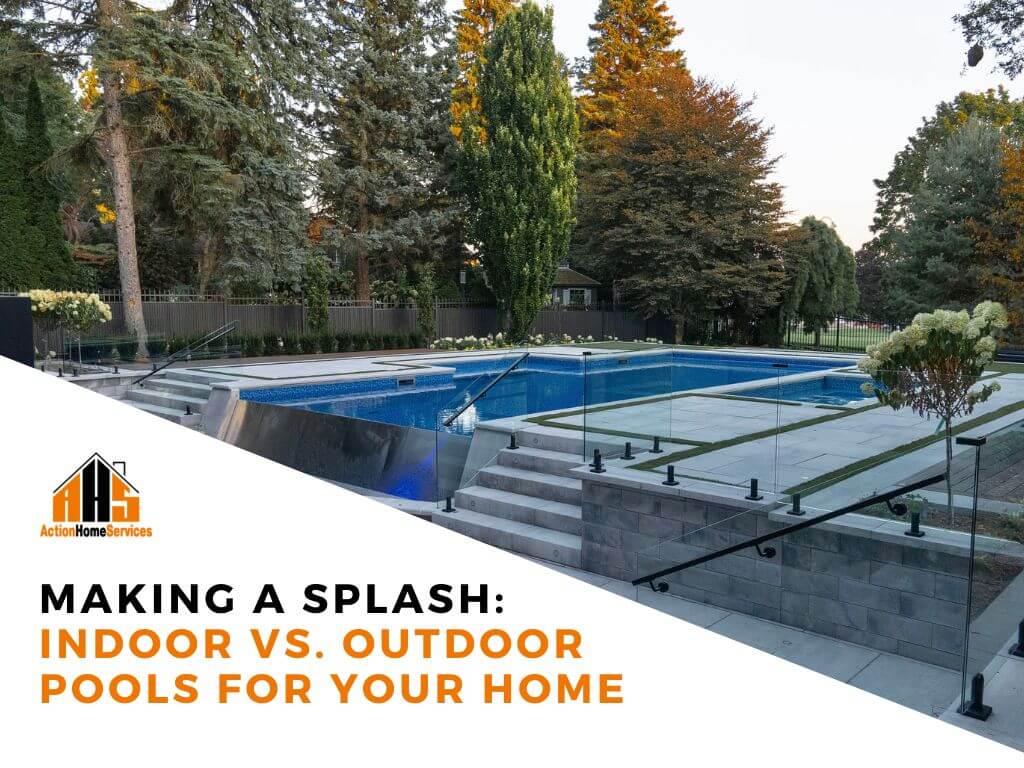
When considering a swimming pool for your home, deciding between an indoor pool and an outdoor pool can be challenging. Both options have unique advantages and drawbacks, catering to different lifestyles, budgets, and preferences. This guide combines their differences, pros, and cons to help you make the right choice.
Pros and Cons of Indoor Pools
Pros:
- Year-Round Usability: Indoor pools allow for swimming in any weather or season.
- Controlled Environment: Water temperature and air quality are easier to regulate.
- Low Maintenance: Enclosed settings prevent debris like leaves or dirt from entering the pool.
- Increased Privacy: Enclosures offer complete seclusion from neighbors and passersby.
- Safety from Wildlife: Wild animals or uninvited visitors are not an issue.
Cons:
- Higher Costs: Building an indoor pool involves higher expenses due to the need for enclosures, ventilation, and climate control systems.
- Limited Outdoor Experience: You miss out on swimming under natural sunlight and enjoying the open air.
Who Should Consider an Indoor Pool? Homeowners who value privacy, year-round swimming, and controlled environments, and who are willing to invest in higher construction and maintenance costs, would benefit most from an indoor pool.
Pros and Cons of Outdoor Pools
Pros:
- Natural Ambiance: Swim under the sun and enjoy the open skies.
- Lower Initial Costs: Outdoor pools are generally cheaper to build.
- Seasonal Enjoyment: Perfect for creating summer memories with family and friends.
- Eco-Friendly Heating: The sun can naturally warm the water, reducing energy costs.
Cons:
- Seasonal Limitation: Usability may be restricted to warmer months, depending on your climate.
- Higher Cleaning Needs: Outdoor pools are exposed to dirt, leaves, and debris.
- Wildlife Intrusion: Animals like deer or birds might occasionally visit your pool.
- Less Privacy: Pools in open spaces are more visible to neighbors or passersby.
Who Should Consider an Outdoor Pool? Homeowners who enjoy seasonal swimming, appreciate natural settings, and seek a cost-effective solution might prefer an outdoor pool.
Key Differences Between Indoor and Outdoor Pools
1. Privacy: Indoor pools provide unmatched privacy, while outdoor pools are more exposed to surroundings.
2. Usability: Indoor pools offer year-round functionality, whereas outdoor pools are primarily seasonal.
3. Cost: Indoor pools require higher upfront and maintenance costs due to enclosures, ventilation, and lighting systems.
4. Aesthetics: Outdoor pools integrate with the natural environment, while indoor pools focus on controlled aesthetics within a closed space.
5. Maintenance: Outdoor pools demand more cleaning due to exposure, while indoor pools have fewer external contaminants.
Conclusion
Choosing between an indoor and outdoor pool comes down to your lifestyle, budget, and priorities. If you seek privacy, year-round swimming, and don’t mind higher costs, an indoor pool might be your best bet. Conversely, if you value open spaces, seasonal enjoyment, and lower upfront costs, an outdoor pool could be the ideal choice.
Take time to assess your needs, and consult with a pool design expert to transform your backyard or indoor space into a perfect oasis!


